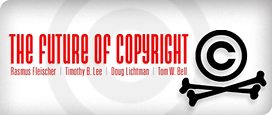Can copyright law avoid picking winners and losers? Rasmus Fleischer argues that copyright law should not favor any particular medium — including, most notably, big-budget feature films. On that view, if Hollywood movies cannot survive the advent of cheap, easy, and widespread infringement, so be it. Doug Lichtman agrees that copyright law should not play favorites — but adds that it need not do so. “[C]opyright law itself does not need to vote in favor of one artist or approach at the expense of another. Instead, when it works, the law allows each artist/entrepreneur to reap what he has chosen to sow and play out the strategy he has chosen for his work and its distribution,” Lichtman concludes.
Lichtman’s adds, however, that to protect Hollywood revenues copyright law will have to move “away from simple first-person enforcement and toward more complicated interventions that, by design, influence the development of technology tools and services.” That sounds about right. Notably, however, those “complicated interventions” will impose new costs on those tasked with helping to police copyright infringement. Here as elsewhere, the privileges that the law grants to copyright holders come only at the expense of others’ rights.
(Another, related but relatively minor, quibble: Contrary to Lichtman’s claim that “the rest of the posters” agree that “copyright law will only be effective” if it adopts those measures, I am not at all sure that expanding secondary liability for infringement will increase copyright’s net social utility. And that — not simply its power to protect copyright holders’ revenues — sets the standard for copyright’s effectiveness.)
Perhaps copyright law can avoid favoring one art form over another. It cannot, however, avoid picking winners and losers. If lawmakers update the Copyright Act to ensure the continued profitability of feature films, the people who develop and use new technological tools will have to foot the bill. Whether we all, on net, come out ahead in that redistributive scheme remains an open question. It is not one we can dodge, however, by ignoring copyright’s losers.

